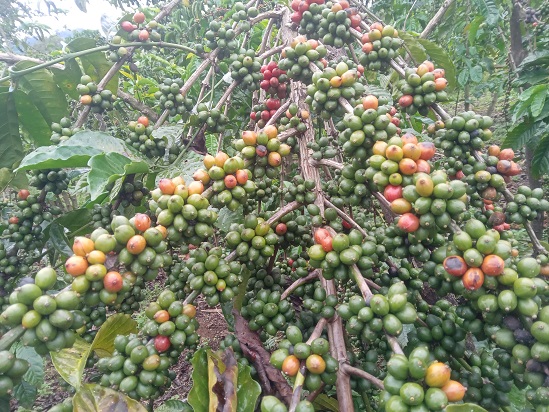Coffee is Uganda’s leading cash crop and a top foreign exchange earner
By Oweyegha-Afunaduula
The coffee crop was first introduced around 1901 and was enthusiastically taken on by Ugandans in the Southern part of the country. Robusta has been the main coffee export of Uganda throughout the country’s history, and for good reason: it originally grew native to the beautiful Lake Victoria, where it was cultivated by the local Baganda people and used for cultural ceremonies, along with its supposed medicinal factors.
It was not until the beginning of the 20th century, during British colonial rule, that British authorities introduced Arabica seeds in the Entebbe area, the headquarters of the government at that time. Though Arabica was highly profitable because of its subtle, varied flavours, the weakness to diseases, impurities, defects and climate change diminished its harvest, thus preventing the wider uptake of Arabica coffee as an exported crop.
By 1931 the indigenous population was getting prosperous due to the coffee crop (Sam Mayanja, 2019). This drew the jealousy of the White Coffee growers who embarked on a persistent campaign through their Planters Associations, for State discouragement of African Coffee production. They argued since there was enormous overpopulation of coffee in Brazil, further coffee production by Africans in Uganda should be discouraged. However, during his short stint as Chief Minister of Uganda, Ben Kiwanuka increased the prices of coffee supersonically and local farmers became rich, were able to take their children to the best schools and to university, and some even bought vehicles.
Although the white coffee planters did not succeed in their campaign to have blacks removed from coffee production, in 1967 a committee of inquiry into the coffee industry recommended that the state should pay a bonus to Robusta Coffee growers as an inducement for them to either uproot their coffee trees or replace them “by any of the approved agricultural activities” and further that Robusta Coffee growing be outlawed completely! (Sam Mayanja, 2019). This too failed. Coffee growing especially in Busoga and Buganda mushroomed. During Amin rule, there was so much coffee production but little market for it internationally. People decided to sell their coffee to Kenya, which then sold it as Kenya Coffee. Kenya’s economy grew spontaneously based on Uganda Coffee, which was called Kasse because farmers and dealers sold it in processed form.
There was renewed attempt to revamp the coffee industry during Obote II but rebel activities of mainly the National resistance army of the then Yoweri Museveni (now Yoweri Tibuhaburwa Museveni) sabotaged the industry, ransacking and robbing Coffee factories and associated cooperative unions and associations of coffee stock and money to fund its insurgency. Some combatants became very rich while still in the bush between 1981-1986.
Uganda is the largest coffee exporter in Africa and the eighth largest exporter of coffee by volume in the world. However, when it comes to coffee-producing countries in Africa, Uganda is not the first one to come to mind. Reportedly the Government of Uganda wants to change this situation.
According to Uganda’s Ministry of Agriculture, Animal Industry and Fisheries coffee is a “strategic commodity in the agro-industrialisation programme under the National Development Plan III (NDP III)’. It has been prioritised for the country’s march towards middle-income status and poverty eradication programme.”
The Ministry reported that coffee provides the needed foreign exchange and is a source of income for 1.8 million households in the country that are involved in its cultivation. Currently, Uganda’s major coffee export is robusta. In August, its exports rose by 48.4 percent to 0.74 million bags from 0.5 million bags in August 2022, per the International Coffee Organization. This represents the second largest monthly exports on record, just behind the 0.79 million bags exported in March 1973. Although robusta is the largest export, Ugandan officials believe there is opportunity in premium coffee (arabica), roasted coffee and soluble/instant coffee.
Hitherto, the Uganda Coffee Development Authority (UCDA), which was established in 1991, monitors and regulates the country’s coffee industry, and advises the Ugandan government on policy issues. In addition to having the responsibility of increasing quality coffee production and productivity, the UCDA is also charged with growing domestic coffee consumption. Given that coffee has been identified as the leading commodity for growth, the UCDA has devised an aggressive roadmap –it includes nine initiatives (see chart below) – to elevate Uganda’s reputation in coffee and transform its coffee sector to achieve the stated growth goals.
The current UCDA managing director, Dr Iyamulemye Emmanuel, is not from the traditional coffee growing areas of Uganda, but from the nomadic-pastoral human energy system based on grass and cow. He is cited in the media saying that the government is undertaking a number of measures to ensure that farmers are producing coffee that meets international market standards and requirements. He says Uganda is looking to export to emerging markets as well as developed markets. Jason Mitchell (2023) writes that Uganda has the potential to challenge the likes of Ethiopia and Kenya as a coffee producer but must do more to convince export markets. Indeed, the country has ambitious plans to triple its coffee exports by 2030, but these hopes come with warnings that the country must adopt stringent food safety standards if it wants to access Western markets (Jason Mitchell, 2023).
In his article “The Politics of Marketing Uganda” published in the Daily Monitor of May 15 2022, Timothy Kalyegira observes that while coffee in Uganda originates from Ugandan farms, the end-user is European or American; implying that effective marketing of Uganda coffee requires sophisticated grasp of its cultural tastes.
In his article published in the New Vision of 18 September 2024, Richard Ategeka reported that the Democratic Party did not agree with the government proposal to integrate UCDA into the Ministry of Agriculture, and argued that UCDA is equipped with the capability to conduct its own research and market analysis, which is vital for the advancement of Uganda’s coffee subsector. Merging it into a Cabinet Ministry risks diluting its effectiveness and stifling its potential.
The politics of coffee in Uganda continues to intensify, with some Members of Parliament accusing government of sabotaging coffee growers as if its aim is to keep them poor. On 24th October, 024, The contentious National Coffee Amendment Bill 2024, which seeks to dissolve UCDA, again was not passed despite a heated debate that ensued in the House. House business came to a standstill for over 40 minutes after opposition MPs once again challenged the Speaker’s decision calling for the tabling of the bill for a second reading. The Speaker was forced to call for a vote by division of the House, with 159 voting yes while 77 voted against, before she adjourned the sitting (NTV, 2024). Members of Parliament (MPs), who fear for the future of the country’s coffee industry (Nile Post, 2024). MPs from coffee-growing regions passionately argued that abolishing the UCDA would mirror the decline of the vanilla and tea sectors, both of which have struggled under the Ministry’s management.
Joseph Ssewungu of Kalungu West asked government actors, “Why do you fear people becoming rich? Why? Why do you fear people having money?”
Connie Nakayenze from Mbale City asserted, “If you remove UCDA, it is like you are draining blood from all the Bagisu because they depend on coffee,”
Joel Ssenyonyi, the Leader of Opposition in Parliament, stressed the need to heed the voices from coffee-growing areas, suggesting the Ministry has failed to manage other agricultural sectors effectively.
It should be remembered that the political Head of the Ministry of Agriculture, Animal Husbandry and Fisheries is Frank Tumwebaze, from the nomadic-pastoral human energy system and, therefore, socioculturally removed from the culture and practice of coffee production.
It should also be remembered that the President of Uganda, His Excellency Yoweri Tibuhaburwa Museveni personally chose to place the Coffee industry’s production and marketing in the hands of a woman said to be an Italian but is really a sister of fallen Libyan strongman, Mammuar Gaddafi. She is called Enrica Pinetti cast as the Chairperson of Uganda Vinci Coffee Company Limited
Nile Post (2024) concludes: Ultimately, the session concluded without a resolution, leaving the future of Uganda’s coffee industry in a precarious state. Stakeholders and coffee farmers alike are left questioning whether their livelihoods are at risk as the government deliberates its next steps”.
There is no doubt that at the centre of all this confusion is the President Tibuhaburwa Museveni-Enric Pinetti Museveni factor, which has been infiltrating the Uganda’s Coffee industry for a long time. Yesterday my sister, Ambassador Irene Wekiya, who represented Uganda in Abu Dhabi whispered to me thus:
“This Coffee saga has been hatched for many years/. In 2013 Pinetti was quarrelling with me for refusing to give visas to her sons to come to Uganda and help improve coffee growing and value addition. Now see what is happening in Parliament, and before that the President had given her monopoly over coffee export.”
She, however, did not tell me that her removal from her ambassadorial job had anything to do with her refusal to give the sons of Pinetti visas. There is evidence from the media to suggest the Museveni-Pinetti factor is responsible for the impasse in Parliament. One time the Daily Monitor’s Felix Ainebyoona (2022). cited President Tibuhaburwa Museveni saying, “We won’t Follow MPs Advice on Coffee Deal”. In another story in the Monitor, Ajuna David (2022) cited the President saying that Pinetti didn’t know anything about Coffee; that in fact he was the Pinetti:” Kenneth Kazibwe (2022) of the Nile Post cited the President saying that he was the one who told Pinetti to start the Coffee deal. Therefore, like he was behind the ill-fated Movement firm called Danza, the President was behind the destabilising Vinci Coffee Company Limited. Thus, the real factor behind the failure, on 24 October, 2024, of the National Coffee Amendment Bill 2024, after a heated debate in the Parliament of Uganda, was President Tibuhaburwa Museveni who previously bulldozed the Pinetti Coffee deal oblivious of the interests of the coffee farming communities in Buganda and Bugisu whose Members of Parliament stood firmly against the Coffee Amendment Bill 2024.
The silence of the MPs from Busoga, which used to be a coffee power house but shifted to sugarcane, betrayed them. They have been reasoning that when they are in Parliament they are for the whole country, but when the interests of Ugandans regarding the coffee industry are endangered, they chose the conspiracy of silence as if they are collectively for the shadowy Pinetti deal, which has already siphoned of billions of tax-payers ’monies.
Clearly. The National Coffee Bill 2024 has not only divided the Ugandan population politically, but it has ushered in a new politics of coffee production and marketing. Will Vinci Coffee Company Limited follow Danze down the path of extinction after siphoning off billions of taxpayers’ monies? Will Ugandans recover their sovereignty over the coffee industry? Will Parliament persist in fighting for the public interest in the coffee industry? What does the 21st Century Coffee industry promise the citizens of Uganda? Will the powers that be succeed in ensuring that the absolute majority of Ugandans do not benefit from it unlike before when citizens became rich and were able to sustain their families and educate their children in the best schools and universities in and outside Uganda and local administrations were able to extend bursaries to the children of the land? Time, the best judge, will tell.
For God and My Country





